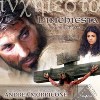Visit the Movie Wave Store | Movie Wave Home | Reviews by Title | Reviews by Composer | Contact me
L'INCHIESTA
Sweeping biblical score shows talent runs in the family
A review by JAMES SOUTHALL
Music composed by
ANDREA MORRICONE
Rating
* * * *

Performed
by
THE CZECH NATIONAL SYMPHONY ORCHESTRA AND CHOIR
conducted by
ANDREA MORRICONE
Vocals
YASEMIN SANNINO
Cello
MILOS JAHODA
Clarinet
LUBOMIR LEGEMZA
Percussion
MOHSEN KASIROSSAFAR
Sitar
PEIMAN TADAYON
Orchestration
ANDREA MORRICONE
Engineered by
SIMONE CIAMMARUGHI
Produced
by
ANDREA MORRICONE
Album running time
70:40
Released by
RAI TRADE
Catalog number
CRT 308
Album cover copyright (c) 2006 Rai Trade Edizioni Musicali; review copyright (c) 2007 James Southall
After writing an exceptional score for Barry Levinson's Liberty Heights in 1999, I fully expected Andrea Morricone to break through and become a much in-demand composer, but since then he has scored only one film of any particular international note, the documentary Capturing the Friedmans, along with a handful of Italian movies (mostly for television). In his relatively brief career he has certainly shown that he is capable of writing very fine music, so perhaps he will get another chance some day to show what he can do on the international stage - I hope so.
His latest Italian project is L'Inchiesta, an ambitious 2006 movie about a Roman investigator sent in 35 AD by Emperor Tiberius to report back on the reports he has been getting of a certain individual who was sentenced to death - but then resurrected. (You may have heard of him.) The cast-list is eclectic, to say the least, with many Italian actors joined by Max von Sydow and the mighty Dolph Lundgren.
Musically, Morricone was given the chance to score a project on a grand scale, and he certainly pulled out all the stops. The score opens with "Battaglia", a lengthy piece of exotic action music which is highly reminiscent of some of the recent action music of the composer's father in scores like I Guardiani del Cielo - with the elaborate percussion, dirge-like brass harmony and large-scale choir, the apple certainly didn't fall far from the tree in the Morricone family. It's an excellent way to get the score going, quite epic in scope, and extremely well-constructed. The grand action music continues in "Taurus", though this time the long-lined theme is given more opportunity to shine.
It is a bit of a relief, in "Gerusalemme", to finally hear Middle Eastern wailing, which has become to ubiquitous in film music, used in a sensible context for once - but after a brief burst at the start of the piece, Morricone introduces a wonderful theme with more than a hint of Jewish folk music about it - it's very beautiful, catchy and evocative. The piece becomes flat-out liturgical towards its end when a female choir is added. Another wonderful theme is introduced in "Cristianita", again with the choir, and this time with piccolo trumpets added - but despite the obvious similarities to his father's music in terms of orchestration, Andrea Morricone sounds distinctive enough that the music has a family resemblance, rather than a distracting sense of being nearly identical.
Inevitably, the music takes on a darker tone before long - "Il Palazzo" introduces an ominous theme for high-register strings, with Morricone also using subtle electronic effects to add to the uncomfortable feel. The suspense continues in "Lapidazione" - another trait the older Morricone has passed on to the younger is the ability to write interesting suspense music (something many film composers seem to really struggle with) - the use of choir, the subtle dissonance, it's so effective. This return to being more melodic in the sweeping "Il Corpo", infused with more than a hint of tragedy, one of the score's most arresting cues. Not surprisingly, the most attractive piece is "Amore" - a simply beautiful love theme; and it's even followed by another, in the sprightly, effervescent "Veglia".
There's still time for a bit more epic sweep before the score ends, with "Maria" fitting the bill in particular; and the finale, "Esodo", is a muscular reprise of the main choral theme. This is a very fine score, large in scope, well-executed, and the mark of a very confident composer. It's impossible not to compare Andrea Morricone with his father, and that this music doesn't suffer too badly in that comparison is an excellent sign indeed. Available on the Rai Trade label from the usual soundtrack dealers, this one is highly recommended.
Tracks
- Battaglia (6:17)
- Taurus (4:22)
- Gerusalemme (5:13)
- Cristianita (2:45)
- L'Incontro (2:04)
- Brixos (2:26)
- Il Palazzo (2:44)
- Lapidazione (3:44)
- Rissa-Presagio (4:09)
- Vita (2:17)
- Strangolamento (1:38)
- Il Corpo (2:27)
- Crocifissione (4:49)
- Amore (3:49)
- Veglia (3:00)
- Attesa (3:35)
- Inquietudine (2:09)
- Maria (4:05)
- Svolta (2:07)
- Verita (4:07)
- Esodo (3:33)